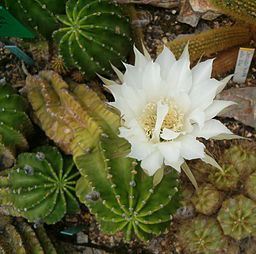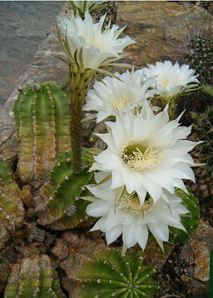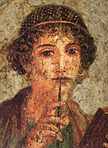Thomas Merton’s “Night-Flowering Cactus”

Photos by German botanist, BotBin, from the Botanical Gardens in Berlin, via Wikimedia Commons
This post was partly inspired by one of my favorite blogs, StuffJeffReads, where Jeff focuses on poetry just as much as prose, often examining individual poems. Following last week’s post on Thomas Merton, I decided to focus on my favorite from his vast output of poetry, “Night-Flowering Cactus” (published in Merton’s poetry collection Emblems of a Season of Fury, c1963).
“Night-Flowering Cactus” is one of the most perfect blends of Christian spirituality and reverence for nature that I have ever encountered. Written in first person from the plant’s point of view, here is a truncated version:
I know my time, which is obscure, silent and brief
For I am present without warning one night only….
When I come I lift my sudden Eucharist
Out of the earth’s unfathomable joy
Clean and total I obey the world’s body
I am intricate and whole, not art but wrought passion
Excellent deep pleasure of essential waters
Holiness of form and mineral mirth:
I am the extreme purity of virginal thirst….
…. He who sees my purity
Dares not speak of it.
When I open once for all my impeccable bell
No one questions my silence:
The all-knowing bird of night flies out of my mouth.
Have you seen it? Then though my mirth has quickly ended
You live forever in its echo:
You will never be the same again.
 The cactus’s prayer is its flower, which accords with Merton’s understanding that “For me to be a saint means to be myself. Therefore the problem of sanctity and salvation is in fact the problem of finding out who I am and of discovering my true self.” (Quote from banner on http://merton.org; I’m not sure of the original source.)
The cactus’s prayer is its flower, which accords with Merton’s understanding that “For me to be a saint means to be myself. Therefore the problem of sanctity and salvation is in fact the problem of finding out who I am and of discovering my true self.” (Quote from banner on http://merton.org; I’m not sure of the original source.)
Merton’s vocation as a Trappist monk, part of a silent order whose members are hidden away from the world, was the path that allowed him the scope to discover his true self. Like the Trappist monk, the night-flowering cactus blossoms in silence and obscurity, opening its deep white flower in the middle of the night. Like the night-flowering cactus, monks rise in the middle of the night to say prayers.
In liturgical churches—Roman Catholic, Anglican/Episcopal, Orthodox, Lutheran, and the like—the Eucharist, the celebration of Mass, marks the meeting place of heaven and earth, the ultimate symbol of The Holy. In the Roman Catholic tradition to which Merton belonged, when Christians partake of bread and wine, these earthly elements become “transubstantiated,” that is mystically transformed into the body and blood of Christ. While the Eucharist is not typically celebrated at night, there are certain special exceptions, such as Midnight Mass on Christmas Eve or Holy Saturday (the night before Easter), and the first stanza of the poem makes it clear that the night-flowering cactus blooms rarely: “I am present without warning one night only.” In searching for pictures on Wikimedia Commons, I discovered that it is also called in English the “Easter Lily Cactus.” (The botanical name is Echinopsis eyriesii.)
The literal meaning of “Eucharist” from the Greek is “thanksgiving,” and in this sense as well Merton’s Cactus offers its flower as thanks, gratitude, and praise. Anyone who has ever watched a seedling come up from the earth, gradually unfolding itself until it lifts its two leaves to the sky, will recognize the similarity to the actions of the celebrating priest who beginning from a bowed position of prayerful adoration then takes up the Host or Bread (white, like the Cactus’s blossom) and raises it to the heavens.
This stanza of the poem is the most moving to me, expressing Merton’s sense of the holiness of the earth, the “unfathomable joy” that nature in general and the soil in particular possess, the soil which makes possible all life through its “mineral mirth.” Like all nature, the Cactus is “not art but wrought passion”; like all plants, it is wrought from the “deep pleasure of essential waters” into “holiness of form and mineral mirth.” The flower’s essence is to rejoice, to model for us what holiness on earth might look like.
The last stanzas return to the theme of silence, and yet there is a tension between the plant’s silence and the poet’s silent witness, for ultimately the act of poetry has paradoxically managed to express that of which one “dares not speak.” A fitting conundrum, emblematic of Merton’s life.
Filed under: Books, Nature, Poetry, Spirituality Tagged: ecostory, Night-Flowering Cactus, Thomas Merton






